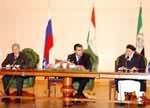Leaders: No Taliban in Future Afghan GovernmentThey expressed this view at a joint press conference after holding talks on the situation in Afghanistan, where U.S. ground troops are fighting in a U.S.-led strikes on the ruling Taliban to punish their refusal to hand over Saudi-born billionaire Osama bin Laden, the prime suspect Washington believes to be behind the September 11 terrorist attacks on the United States. Putin said the tripartite talks were detailed and of great significance, during which they discussed the current situation in Afghanistan and future. He said Russia's policy toward the Afghan issue is aimed at creating an environment in which "the Afghan people can determine Afghanistan's fate on their own and begin a peaceful life." He reiterated Russia's consistent support to Rabbani and his anti-Taliban forces in Afghanistan's opposition Northern Alliance, while pledging continued military and technical assistance as well as more humanitarian aid to refugees made by the current fighting. Rabbani, who was deposed by Taliban in 1996, is still recognized as Afghanistan's president by the United Nations and most countries. His forces still hold the northeastern part of Afghanistan. Rabbani told the press conference it is necessary to start working with a political agenda along with the military strikes on Taliban and terrorists, in order to pave the way for the Afghan people to freely choose which course their country will take after the Taliban rule. At the same time, he stressed his opposition to any foreign interference, which he said is the hotbed to breed organizations like Taliban. Tajikistan pledged support too to Rabbani during the tripartite talks. In a joint statement issued after the meeting, the leaders urged a quick conversion from the current U.S.-led military intervention to a political settlement of the Afghan issue, with the purpose of establishing a widely-based ruling coalition representing all parties in Afghanistan. Meanwhile, the three leaders stressed the need to highlight the U.N. role in the process. They also proposed officials at different levels from the three sides to hold frequent consultations on the tension in Afghanistan. Tajikistan is a key base for neighboring Afghanistan's anti- Taliban opposition. |
| People's Daily Online --- http://english.peopledaily.com.cn/ |
